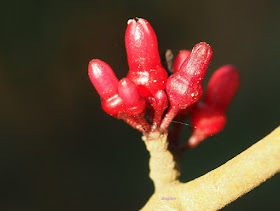Now i am wondering whether they really prefer the heat, or they are blooming more because they are dying, as a precautionary response to preserve the species.
At the right above, is Cymbidium finlaysonianum, a native orchid that has most leaves yellowing due to the intense sunlight. The past years claimed many big plants in this clump, these few plants are just growing nicely because i put it under the hoya plants. There they got the water drippings, felt colder and were able to recover. But afternoon direct sun still turn the leaves yellow.
Red salvia also responds favorably to the intense heat. More flowers per inflorescence are produced.
At the right is Hippeastrum reticulatum, also a survivor.
These 2 above vanda orchids are blooming also well. They are directly exposed to the sun, so let us see if their leaves will be able to withstand the long dry and hot season.
Dischidiopsis parasitica, endemic to the Philippines, blooming profusely too. We don't water them.
Hoya halconensis has one of the biggest umbels in my collection, and it really gives back high return on investment, i.e. labor hours
Hoya sp aff. camphorifolia. This means it doesn't have an exact ID yet but has affinity with the Hoya camphorifolia group. It belongs to the small hoyas. Can you see the larva munching on a bloom? I just saw it when i played back my shots, so i went back to the plant and removed the larva.
Hoya merrillii looks radiantly lovely. However, the umbel is not as organized as most hoya umbels.
Hoya carnosa red is very slow growing, but its flowers are so lovely that its worth the wait.
Hoya multiflora is exceptionally lovely too, with their flowers like arrows, making its common name as "shooting stars hoya".
Look at other Hoya multiflora umbels, they promise a big turn-out.
This is a young umbel of the black hoya. One plant has 8 umbels at different stages of development, how lovely it would be if they bloom at the same time.
This is the more mature buds of the black hoya, Hoya pubicorolla.
very young buds of Hoya carnosa
another Hoya carnosa with a cotton bud resident
A few buds are waiting to bloom, but i left home while they are still tightly closed. This particular species love the full sun, so it has been growing outside the single black net. That cotton bug at the background, like me, seems patiently waiting for the buds to open. How i wish i am home when all of them opens almost simultaneously.























Beautiful flowers. I can't imagine that kind of heat - we're expecting another snowstorm this weekend.
ReplyDeleteOh yes Al, we are like in 2 different planets, haha. I dream of walking barefoot on dried autumn leaves, but my few visits to your kind of country always coincide with spring, so no autumn nor snow experience yet.
DeleteI am so glad I decided to visit your lovely blog again, I haven’t been here for a while, but what a treat to come here today and see all your lovely hoyas! It is now 11 months since I moved house and I am now ready to look for a suitable hoya for my living room. I need to find one I can manage long-term indoors so if you have any suggestions I would be grateful. I would of course also appreciate to have one that flowers beautifully, and one I don’t have to wait too long for to see the flowers.
ReplyDeleteI have been fascinated by hoyas for many years but had no suitable place where I lived before. Here in my new house I have a suitable window for ONE hoya. Tough choice!
Oh hi Helene, thanks for dropping by. In my few weekend visits at home in the province my time are devoted to hoyas and always vey limited. Even at night i try to do some hoya chores.
DeleteThere is one very successful hoya grower in Sweden,which i think will probably be more close to your condition than ours. She has a lot and all of them indoors, growing beautifully all the time. She is Christina Karlsson with a websight and an active FB wall too, www.myhoyas.com. i will not advise you which species to try because different conditions affect growth and flowering. I suggest you visit her site or communicate with her. Our Heat Index now is >40C at temperature >36C, so you can imagine the difference. But i have an advice, hoya is addictive and contagious too, so please be warned. Hahaha
How fascinating the way the plants respond to the intense heat. We don't have extended intense heat here very often, which is good because many of our plants wouldn't be able to take it. Beautiful images, as always. I hope the temperatures will lower soon for you.
ReplyDeleteThanks Beth, our plants amaze me as they can tolerate the heat, but the coming months will kill most of them especially the shallow rooted ones. I am now here at home and even the air is very hot. The normal rainy season starts in May, but El Niño prolongs it to end of June, says the weatherman. At least my hoyas love it still this moment. I have lots of flowers.
DeleteI have a hoya from my mother. Flowers are a quiet pink, perhaps carnosa.
ReplyDeleteThis year it bloomed for the first time ... but I missed the photo op. Mine is in the dappled shade under a shrub.
Everything looks so lush and green, and the flowers are gorgeous! Great close-ups too. I'd like to invite you to share your flowers with Today's Flowers. Our new link opens tonight at midnight our time, and the address is: http://anenglishgirlrambles2016.blogspot.com/ Hope you will join us to share your super photos.
ReplyDelete